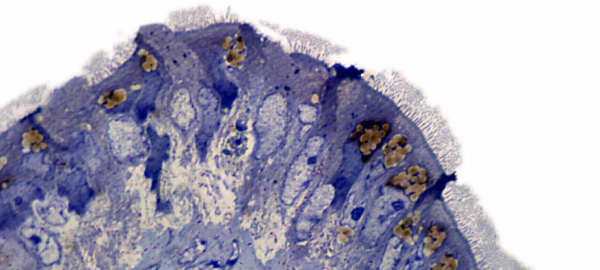Beauty of Digital Histology, an open educational resource

Showing through April 2022
March 7-11 is Open Education Week, an international celebration that aims to raise awareness about the positive impact of open education on teaching and learning worldwide. Open education is comprised of resources, tools and practices created through the use of free and openly licensed materials.
These materials, known as Open Educational Resources (OER), are teaching and learning materials that are free to access online and shared with open licenses that allow for unrestricted use, retention, sharing and editing by faculty and students. OER can be any type of teaching or learning materials, including textbooks, images, videos, slide decks, assessments, syllabi, and whole courses. Not only do OER help relieve the burden of the high cost of commercial textbooks, but they have also been shown to increase student success, especially those from traditionally underserved populations, like minorities and first-generation students.
To mark Open Education Week, the Cabell Screen presents images from Digital Histology, a richly illustrated and interactive OER that teaches the microscopic structure of tissues and organs.
These hauntingly beautiful scientific images were compiled by the project team of John Bigbee, Ph.D. and Alice Pakurar, Ph.D. (coauthors), Kenneth Foster, Ed.D., and Thomas W. Woodward, M.S. (design coordinators), and Carole W. Christman, Ph.D. (medical illustrator). Digital Histology was developed by the Department of Anatomy and Neurobiology and the Office of Faculty Affairs, VCU School of Medicine and the ALT Lab, with support from an Affordable Course Content Award in 2018. The Affordable Course Content Awards program is a cross-institutional partnership led by VCU Libraries that supports faculty as they transition to zero textbook costs for their courses.
Dr. Bigbee shared his experience with creating Digital Histology and the impact it has on his students, teaching experiences, and career in his interview “Why Bigbee chooses open: flexibility, access, student engagement,” one interview in the new “Why We Choose Open: OER Stories” series.
Digital Histology is a major resource for histology instruction in the undergraduate, graduate, medical and dental curricula at VCU. It combines a digital atlas with extensive descriptive text. Its menu-driven navigation reinforces broader histological concepts and parallels the content of traditional histology textbooks. It includes over 1000 high quality, high resolution histological images accompanied by descriptive introductory text and on-demand, dynamic labeling of structures. It also provides interactive quizzes with feedback and randomization of images, including hiding of labels for an additional self-assessment mode. VCU Libraries’ Open and Affordable Course Content Initiative provides education on open education and textbook affordability and direct support for the adoption, customization and creation of open educational resources, including managing the Affordable Course Content Awards. To learn more or explore the possibility of using or creating OER, visit the initiative’s website or contact Open Educational Resources Librarian Jessica Kirschner at kirschnerj2@vcu.edu.
Categories Collections, Open Educational Resources